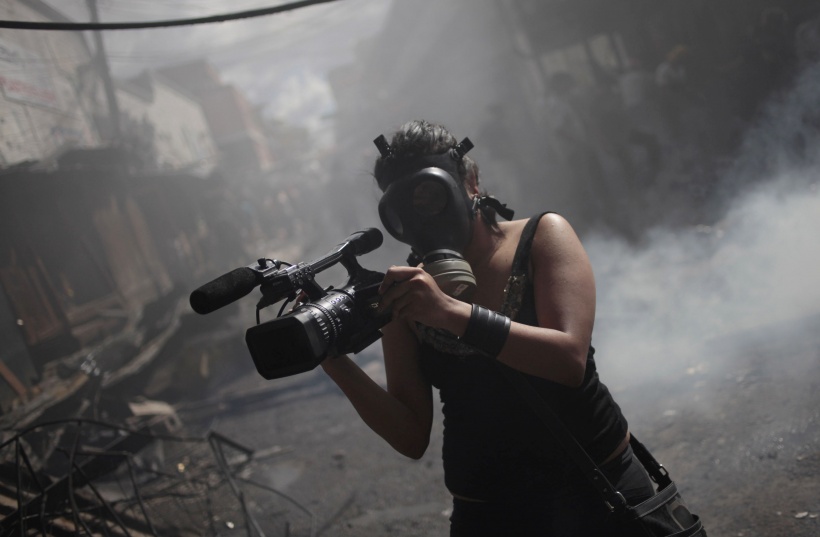'Reporting Safely in Crisis Zones’ Course
2950 Broadway
New York, NY, 10027, United States
Get Directions on Google Maps

A local journalist covers a fire at the Comayaguela market in Tegucigalpa, Honduras, on February 18, 2012.
With generous support from the James W. Foley Legacy Foundation, the Rory Peck Trust, and the ACOS Alliance, the Dart Center will be offering its annual four-day crisis zones reporting course to 16 freelance journalists at no cost.
Covering crisis presents some of the biggest challenges in the journalism profession. Reporters must make quick decisions on whether to trust a translator or drive down a dangerous road. This course will teach you how to operate with caution in volatile situations, with an emphasis on conflicts. The training is also relevant to working in natural disaster situations such as earthquakes, hurricanes, and tsunamis. While most hostile environment training for journalists deals with ducking crossfire and kidnappers, this course will teach you how to avoid unnecessary peril through preparation and planning before, during and after assignments. Participants will emerge from the course with a better understanding of how to hire fixers, shun attackers and protect their digital footprints.
Expert trainers will provide instruction in the following areas:
- Risk assessment: making the right decisions before and during an assignment, setting limits, sound practices amid riots, snipers, mines, shooting, roadblocks, infiltrators and general mayhem.
- Digital Security: safeguarding sensitive computer data and communicating with others in a secure manner. Coding, encryption and cloud computing skills are taught.
- Emergency first aid: tourniquets, triage, fractures and bullet wounds.
- Trauma awareness: emotional self-care while covering troubling stories.
- Rape/sexual assault prevention: setting boundaries, delaying tactics, basic self-defense and healing.
Lead Instructor: Judith Matloff, adjunct faculty, Columbia Journalism School and former conflict correspondent with more than 30 years of experience. The course will be held October 24 - 27, 2019, at the Columbia Journalism School in New York City.
All program sessions are conducted in English. Participants must be fluent in spoken English.
APPLICATION INFORMATION
The application deadline -- June 24, 2019 at 5:00 pm EST -- has passed.
The course fee – regularly $1175 USD – has been underwritten by the James W. Foley Legacy Foundation, the Rory Peck Trust, and the ACOS Alliance. Therefore accepted applicants will not be responsible for any tuition fees to attend the course. However, all participants will be responsible for their travel, lodging, ground transportation and meals.
Sixteen freelance journalists from around the world will be admitted.
Participation is open to freelance journalists only.
Course Testimonials:
It was such a joy to attend the class. The course was incredibly informative and helpful. It is things like your course that make me proud to be a journalist and hopeful for the industry. It will make the next generation safer, wiser and more informed.
– Andrew Burton, photographer for Getty Images
I used to operate with a mindset that either one of two things would happen to me: 1. Nothing, and hence I'd be fine; or 2. Something bad, and hence I'd probably die. Now, thanks to [the medical instruction], I realize there's a third option: Something could happen to me and I could survive, simply due to being more prepared and having some basic training. And that's a great feeling.
– Joshua Hergesheimer, independent writer/photographer (Canada)
I appreciated Judith's candor, support and words of guidance over the four days we spent together. Too often people tell me, "You can't go there, you can't do that story," and it was refreshing to meet someone and receive instruction from a group of people who, instead, said, "Look I know you're going to go there, so here's how you do so safely." Working as a journalist in Myanmar, I use a lot of the techniques taught in the course on a regular basis. Information and cyber security, surveillance awareness, and pre-trip planning have become a vital part of my safety plan and ability to keep working here. The course also covered issues that women journalists are at higher risk of encountering, such as assault and rape. I find myself thinking back to the skills I was taught and feeling confident in the fact that I am better equipped to protect myself.
– Victoria Milko, multimedia journalist and writer (Myanmar)
This was the most informative four days of my life and put my previous trainings and degrees to shame. It has really motivated me to stay active and pursue a successful career in journalism.
– Venetia Menzies, photographer and journalist
Please email any questions to [email protected].